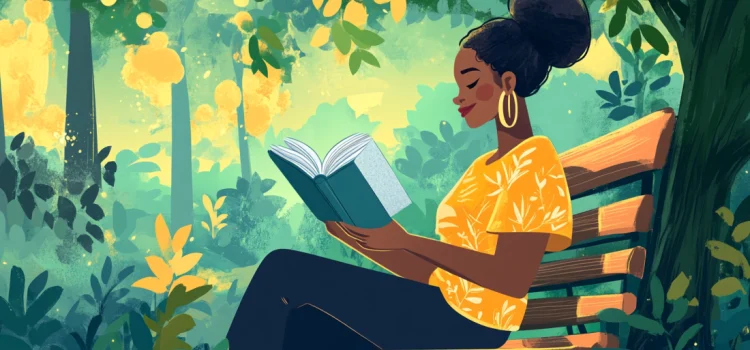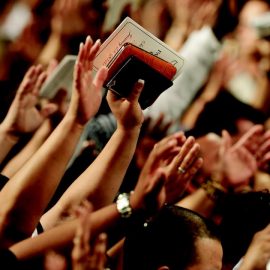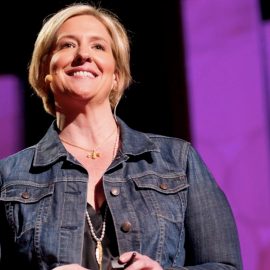

This article is an excerpt from the Shortform book guide to "Unbound" by Tarana Burke. Shortform has the world's best summaries and analyses of books you should be reading.
Like this article? Sign up for a free trial here.
What’s Unbound by Tarana Burke about? Why did Burke start the phrase “Me Too?”
In Unbound, award-winning activist Tarana Burke explores the pivotal role she played in founding the #MeToo movement. Burke coined the phrase “me too” as a tool for healing from sexual violence based on her own journey of recovery via community connection, and she continues to work toward healing sexual violence in the Black community.
Read below for a brief overview of Unbound.
Unbound by Tarana Burke
You’ve likely seen the hashtag #MeToo plastered across social media timelines and news headlines, but you may not know where the movement originated. In Unbound, Tarana Burke explains how her community activism and journey of recovery from sexual violence led her to coin the phrase “me too” as a tool for healing. Burke also describes how that phrase inspired a revolution and explores the way her work relates to and departs from the viral #MeToo movement, which signaled a seismic cultural shift encouraging survivors to speak up about their experiences. (Shortform note: We’ll use “me too” to refer to Burke’s movement and “#MeToo” to refer to the viral movement Burke’s work helped inspire.)
For her part in pioneering the “me too” movement, Burke was named a 2017 Person of the Year by TIME Magazine and was awarded the 2019 Sydney Peace Prize alongside several other honors. Burke continues to lead the “me too” movement toward its goal of empowering and helping survivors of sexual violence to heal.
Burke’s Childhood Was Defined by Shame
Burke’s involvement in anti-sexual violence activism is rooted in her own experience of childhood sexual abuse. In this section, we’ll briefly describe how her victimization and other experiences inspired a deep-seated sense of shame.
Burke’s Experience of Childhood Sexual Abuse
Burke says the first time she was sexually assaulted, she was seven years old—too young to understand what was happening to her. When she was playing outside, an older boy who lived in her neighborhood led her out of her parents’ sight, penetrated her, and ejaculated on her (she thought he urinated). Then, beginning at age nine, she was molested by a different boy in her neighborhood. He took photos of the abuse and used them to blackmail her into submission, which worked until a painful encounter (he knocked against the cast on her broken leg) spurred Burke to fight back and steal his camera at the age of 12.
The abuse Burke endured made her feel humiliated and frightened, but she didn’t tell anyone what happened for two reasons. First, she felt that she had done something wrong and would get into trouble if she disclosed the assault. Burke explains that she had been taught not to let anyone touch her genitals, but she didn’t understand that this advice was intended as a warning about sexual violence. She blamed herself for allowing someone to touch her, even though she didn’t have a choice. This led her to develop a deep sense of shame and conclude that she was a bad person. As a result, she often falsely confessed sins at her Catholic school, contriving opportunities to repent for what she considered truly sinful (her victimization).
Second, Burke worried that her stepfather would go to prison for hurting the boys who abused her. Burke describes her stepfather as a respected authority figure in her neighborhood, and she’d seen him become violent with others who harmed people in their community. Since they were family, this possibility seemed even more likely. When Burke stole her abuser’s camera and ran away from him, she ran into an elderly neighbor who guessed what had happened. This neighbor told Burke not to tell her stepfather about the abuse because he was too valuable a part of the community to lose to prison, reinforcing Burke’s silence. (Later, her stepfather went to prison for an unrelated reason, and Burke says she inexplicably felt she was to blame.)
Other Sources of Burke’s Shame
Burke explains that in addition to the sexual abuse she suffered as a child, two other major forces influenced her strong sense of shame. First, by the age of 12, she believed she was ugly due to strangers’ unkind stares and comments about her appearance. Burke explains that the notion that she’s ugly is rooted in anti-Black beauty standards—she describes herself as having a large nose, full lips, and dark skin, features that are often stigmatized. She was raised to love being Black, but the callous comments she received still took a toll on her. She didn’t just believe that she was ugly—she believed that because she was ugly, she deserved cruel treatment.
The second force that contributed to Burke’s pervasive feelings of shame was her mother’s tendency to yell at and humiliate her for minor infractions. For example, as a child, Burke once wondered what dish soap tasted like and touched a used dishrag to her tongue to find out. Her mother saw her, became furious, and berated her by suggesting she was a disgusting dishrag.
Later, when Burke had consensual sex for the first time as a teenager, her mother found out about it by reading her diary and responded in an angry, judgmental way, which made Burke feel ashamed. She also forced Burke to see a gynecologist and get tested for sexually transmitted infections, which was painful and retraumatizing. Burke says that by treating her this way, her mother confirmed her belief that she was inherently flawed and unworthy of love.
A Boon to Burke’s Shame
Although shame permeated her childhood, Burke eventually found a bit of relief from that feeling. When she was 12, she read renowned poet Maya Angelou’s autobiography, I Know Why the Caged Bird Sings, which depicts Angelou’s experience of childhood sexual abuse. Burke says empathizing with Angelou, whom she viewed as blameless and undeserving of the abuse, taught her three things: First, she wasn’t alone—other girls experienced sexual abuse, too. Second, the abuse wasn’t her fault. Third, the abuse didn’t have to hold her back—Angelou’s life journey demonstrated that it was possible for a Black girl who’d been sexually abused to grow into a self-assured, graceful, and successful adult.
Burke Channeled Anger Into Activism
Although Burke’s childhood was defined by shame, that feeling transmuted into anger when she was a teenager—and Burke channeled it into community activism. In this section, we’ll discuss the events that led to this transformation and explore how Burke’s activism made her feel empowered. Then, we’ll discuss how Burke turned community organizing into a career that was both rewarding and challenging.
Burke’s Pro-Black Radicalism Empowered Her
Burke explains that although she found solace in the Catholic Church’s teachings about redemption and forgiveness as a child, she gradually divested from the church she’d grown up in and chose to attend a public high school. This transition took place because her grandfather, a fiercely pro-Black radical follower of activists like Malcolm X, encouraged her to read books about Black history and to question the church’s complicity in the slave trade. In high school, she became known for her pro-Black views, which she defended staunchly when faced with racist lessons and comments from white teachers.
Around the same time, Burke’s shame transmuted into anger. Burke explains that when she had conflicts with other girls at her high school, an internal switch flipped—instead of silently putting up with this mistreatment like she would have as a child, she exploded with rage and physically fought back. Standing up for herself made Burke feel empowered after a lifetime of helplessly enduring victimization. Due to the fights she got into, her mother transferred her to a different high school at the end of her freshman year. At her new school, Burke resolved to imitate her role model, Angelou. She stopped fighting, excelled academically, and got her first job—and her boss nominated her to attend a school-sponsored youth leadership conference.
The leadership conference Burke attended opened the door to a healthier outlet for her rage. It was organized by the 21st Century Youth Leadership Movement (21C), through which civil rights-era activists taught young people the ins and outs of community activism. Burke became president of her high school’s chapter of 21C, where she worked with colleagues on the Central Park Five case, which involved the wrongful conviction of five teenage boys of color (one of whom she knew) for the rape of a white female jogger in New York City’s Central Park. Burke says that although she still wasn’t acknowledging or dealing with the abuse she suffered, her work as a pro-Black activist with 21C helped her funnel her rage into a productive cause: fighting oppression.
Burke’s Activism Was Both Rewarding and Challenging
Burke says her involvement in 21C also opened the door to higher education and a career. After high school, she didn’t have the financial resources to attend college, so she took some time off from school and worked to save money. When one of 21C’s leaders, Rose Sanders, heard about her plan, she pulled strings to get Burke accepted to Alabama State University with full funding. During Burke’s freshman year of college (1992), she continued her activism by organizing protests against racism and sexism. In recognition of her talent and passion for community activism, 21C offered Burke an organizing job in Selma, Alabama when she graduated from college.
Burke explains that her job entailed helping to lead youth camps. At the first camp she organized, she connected with a troubled girl named Heaven. Burke believed she could teach Heaven to channel her rage about injustice into more productive outlets, and together they made progress toward that goal.
However, when Heaven confided in her that she’d been sexually abused, Burke handled it poorly. The conversation triggered her own feelings of grief and shame, so she ended it abruptly and referred Heaven to another camp leader. This broke Heaven’s fragile trust and their connection. When Burke thought about how to handle similar situations in the future, she realized she had to work through her trauma. She started by admitting to herself that she’d been abused.
How Burke Founded the “me too” Movement
After Burke’s experience with Heaven prompted her to take the first step toward healing, she continued to pursue both personal and professional growth. In this section, we’ll discuss how becoming a mother inspired Burke to deepen her commitment to healing and protect her child from abuse. We’ll also discuss how a series of betrayals and dead ends in her community led Burke to help others heal by founding the “me too” movement.
Motherhood Empowered Burke to Resist Abuse
After Burke moved to Selma, her on-and-off boyfriend, Sean, joined her. She reveals that Sean had always been abusive—for example, when they were in high school, he threatened to kill himself if she moved away for college. But she didn’t realize that he was abusive until an incident that occurred after she became pregnant at age 23. During an argument, Sean attacked her, trapped her for hours, threatened to kill her, and finally raped her. She realized that this was different from other fights they’d had—he took advantage of her pregnancy, which made self-defense more difficult. She knew that she didn’t want to expose her child to such an unhealthy relationship, so a few days later, she broke up with him and kicked him out.

———End of Preview———
Like what you just read? Read the rest of the world's best book summary and analysis of Tarana Burke's "Unbound" at Shortform.
Here's what you'll find in our full Unbound summary:
- The origin of the viral phrase “me too”
- What Tarana Burke did to heal from the experience of childhood sexual abuse
- The story of the #MeToo movement






